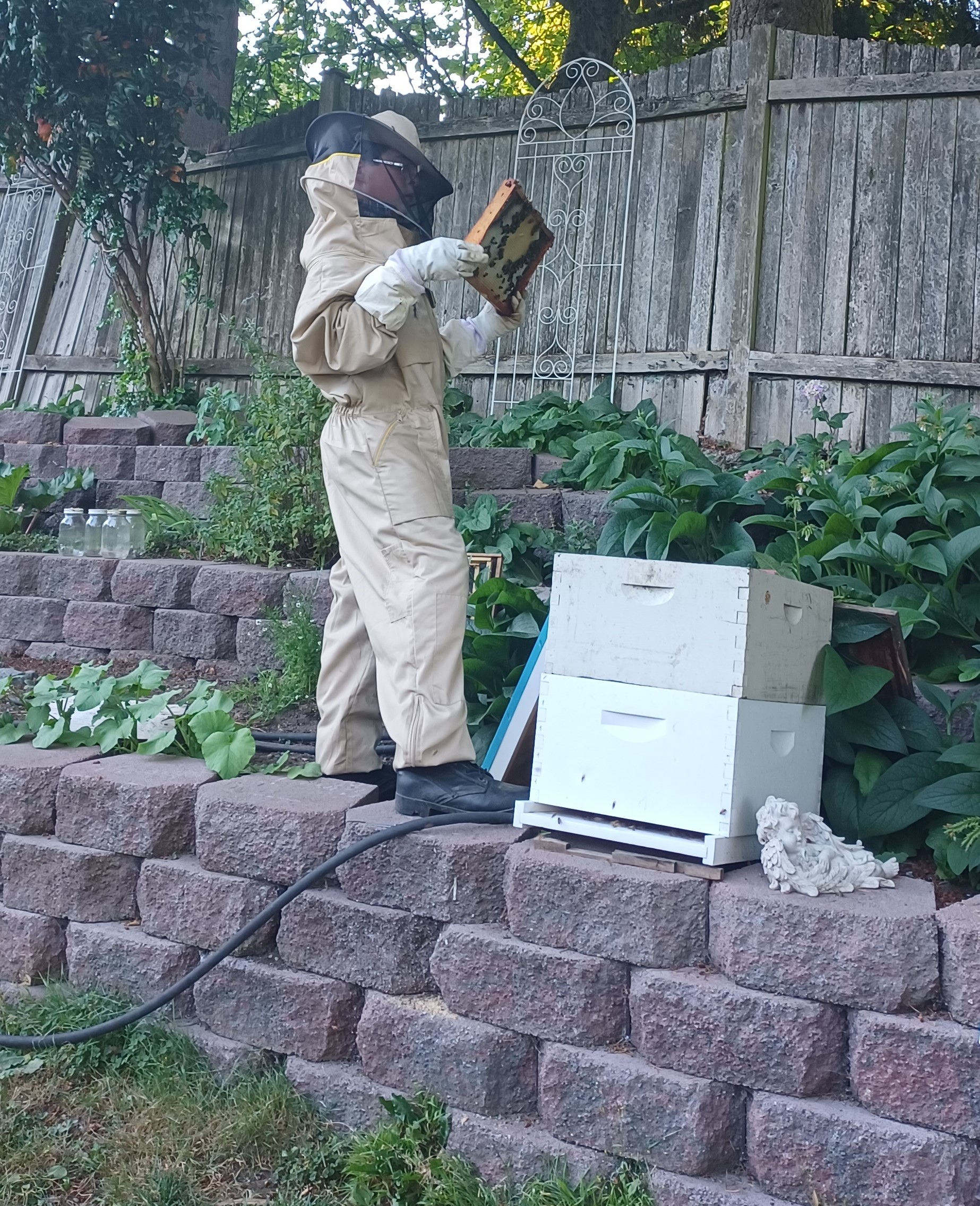Open to the Public: Apiary & Hive Observation
Welcome to Honey Goods LLC Public Apiary Hive Observation:
Apiary Hive observation offers a wonderful opportunity for the public to engage directly with the fascinating world of beekeeping. By providing a space where individuals can observe honey bees in action, these experiences foster a deeper understanding of the vital role bees impact our ecosystems. Under the guidance of an experienced beekeeper, participants can learn about the intricate behaviors of honey bees, from how they communicate and organize within the hive to how they interact with the environment outside. Through these interactions, participants gain a better understanding of the delicate balance of nature and the critical need for responsible beekeeping practices, making it a rewarding experience for all involved.
At Honey Goods Apiary, we are dedicated to sharing the unique and fascinating craft of managing and keeping honey bees. As a 9yr Journeyman Beekeeper I am deeply passionate about our honey bees and love to share the world of beekeeping with others in the hopes of passing on their knowledge and the meticulous care Honey Bees receive.
What is Apiary Hive Observation:
During hive observations at Honey Goods LLC Apiary, we will suit up and open one of the Bee Hive Colonies. You will witness firsthand the incredible activity of Honey Bees as they demonstrate their duties and determination to thrive. By transforming natural resources Honey Bees collect, these diligent creatures work together as a super organism to build out their colony, to raise brood, feed and clean the queen and their young, guard the hive, forage for food, maintain hive temperature, and communicate effectively within the colony.
We believe that observing Honey Bee activities up close offers a profound insight into the complex and harmonious world of Honey Bee colonies. Honey bees are not only essential for pollination and the production of honey, but they also serve as indicators of environmental health. Your visit to Honey Goods Apiary will highlight the importance of protecting and supporting these invaluable creatures ensuring they continue to thrive for generations to come. Recently there is a growing awareness of the plight of the Honey Bee. By the end of your visit, we hope you will walk away with a greater understanding of our relationship with Honey Bees and the crucial role they play in our ecosystem and our health.
Where you can help Honey Bees and their Pollinator Community:
Nutrition plays a big role for healthy Honey Bees and Pollinators. We can actively support Honey Bee Nutrition through other methods than owning a Bee Hive Colony. Consider planting a pollinator garden in addition to vegetable/ herb gardens. Use natural pest control without the use of pesticides or insecticides that contain neonicotinoids that will decimate a Honey Bee Colony. These pesticides and insecticides stay in the ground, on our food, herbs and flowers which also find a way in to our bodies.
Offer a nutritional water trough. This simple act opens up a world of activity you would have not noticed anywhere else in your backyard. A nutritional water trough attracts all pollinators. You will be able to safely observe up-close a community of pollinators coming together to enjoy a much-needed refreshing drink to re-energize and then go about their duties. You will notice the community will increase as they spread the word…
Allow wild flowers and “weeds” to thrive as the first nectar harvest in the early cold wet spring. As the temps begin to rise above 50d the Honey Bees are starting to venture out of their winter huddle literally starving. Wild Flowers and Weeds are the first to arrive with the nutrient rich nectar desperately needed from the long winter dearth.
Put out wasp and hornet traps to keep the aggressive pest population down. Wasps and Hornets can invade Honey Bee hives. Their goal is to conquer and consume the nutrient rich eggs, larvae, young bees and the Queen.
Requirements for Hive Observation event
To have a successful Hive Observation event the following requirements must be met:
- Hive Observation can be scheduled Monday thru Thursday
- Temps must be above 50d consistently and no rain in the forecast for approximately 3 days
- A group can consist of no more than 4 minimum to 6 maximum participants. Children under the legal age must be accompanied by an adult.
- Each participant will be suited up in a Bee Suit.
- Review and follow the guidelines “How to prepare for Apiary Hive Observation”
How to schedule Apiary & Hive Observation event
Visit web site https://HoneyGoodsLLC and down load (right click in the content and select print) “Requirements” and “How to prepare for Hive Observation” documents. Review each document carefully before making an appointment for Apiary & Hive Observation. If you have further questions, please feel free to contact Honey Goods LLC to discuss your concerns and all safety precautions.
Contact Honey Goods LLC via email or phone to review requirements.
- ***HoneyGoods3@usa.com
- *** cell: 425.245.3832
- ***Scheduled Event:
- ***Location: 3223 151st St SW, Lynnwood, WA 98087
Parking:
My overwintered hives are located in a residential dead-end street. Parking is available on the street.
Note: There are dogs, chickens and goats on the property. The dogs are overly friendly; the goats are not; both will be put away during the visit. Please beware If you have any animal dander allergies.
**Please print and bring with you to your scheduled Apiary Observation event document.

